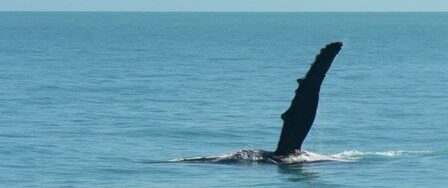In 2022 the whales of Lulim gave a demonstration of why they call our country the humpback nursery.
The 2022 season was one of the most active we have seen of mothers and calves.
Whether this means that there has been a big birth year, and/or the population needed to spend more time in country using it to get strong, we are not sure – but we are sure that it was a privilege to see, and be amongst.
None of the team can recall seeing so much family activity in the waters directly around our base camp.
The photos in this update are from a spectacular encounter we had at the heart of the Lulim Mundumbun whale dreaming songline as the family went back to visit Isobel’s mother’s birthplace.
Isobel’s mother was the last in her tribe to live in the country before forced relocation and this area, and the whale songlines, are a special part of the clan area history, and the obligations of Isobel and her family in keeping this land and waters healthy and for its purpose – a sanctuary for whales and all life indigenous to here.
“When we have days like this we know the country and all the life is happy to have us back in country. It is showing us that this power, the wungur, is still strong,” Isobel said.
On a number of days when we surveyed through the Montgomery inshore reef areas and islands, corridor to Raft Point and up to the north, we saw six mother and baby pairs or pods with mother and calf.
“Whales literally gave birth out the front of our camp right where we anchor our boat – we had to wait until they were finished. It was very special. There were a number of births in the shallows directly out front of our camp this year.”
Isobel said she was happy that boats were sharing information about whales in the area, not just for watching, but so everyone could be prepared when driving through the area.
“It is important we let boats know in the area if there is a lot of activity with the whales.
The tourism cruise operators we worked with reported some spectacular observations and Isobel was very pleased that the whales put on a good show for the visitors.
“We had some very special viewings when tours came to camp, from the arts shelter. Guests were really fascinated and over-joyed to see them.”
The year ahead will see Isobel continuing to work on getting the sanctuary zones more reflective of the whales and other wildlife activity.
“I am still going, talking up on this issue. The zones were set at the beginning and we said then that some uses did not reflect the values to be protected. The park management knows more now too so hopefully we can take this next step I have been asking for since the park was formed.”
Partnership adding detail to our history in country
This year we had some special visitors to country, working with Isobel and the family on dating the clan occupation of Lulim.
Isobel’s clan estate is already one of the oldest dated human occupation sites in Australia at around 50000 years.
“I am interested in knowing the science and what it can show me,” Isobel said.
“I also know that a lot or almaras (outsiders) don’t listen to us they only listen to this kind of thing, so it helps us show them too, like our Old People did, that we aren’t making stuff up.”
The team included Dr Sue O’Connor, who did the original excavation in this area 40 years ago.
Stay tuned for more reports on this work. We are not promising anything but the fieldwork was very encouraging and only enhances the existing information and picture of how long Isobel’s family lived and used this area.
Wijingarra under threat
The information we are receiving is the cane toads are continuing to expand westward placing our wijingarras (northern quolls) at risk of extinction.
The toads are a long term known problem, a failed biological control experiment.
Recent floods in the Kimberley may have transported the toads even further westwards.
Isobel is working closely with her wider tribal group the Dambimangari Aboriginal Corporation (DAC) to monitor and protect the wijingarras.
“These are special animals in our dreamtime and also in this time. They live in the caves where my Old People lived. We live and share our camp with them out here. My grand-daughter and daughter have them living in the beams of their rooms! We will protect them by protecting our land and waters. They need our help and we will, with the help of others, be there for them.”
Plastics continue to be a drifting problem
Our regular beach patrols turned up more evidence of the issue of drifting plastics.
We continue to find a variety of plastic bottles that are not sold or available in Australia washing up on our beaches and mangroves.
This lot were products from as far away as China, Malaysia and Indonesia.
We feed our reports and information to the wider tribe and government including through Isobel’s role as a board member on the Lalang-Garram marine park.







